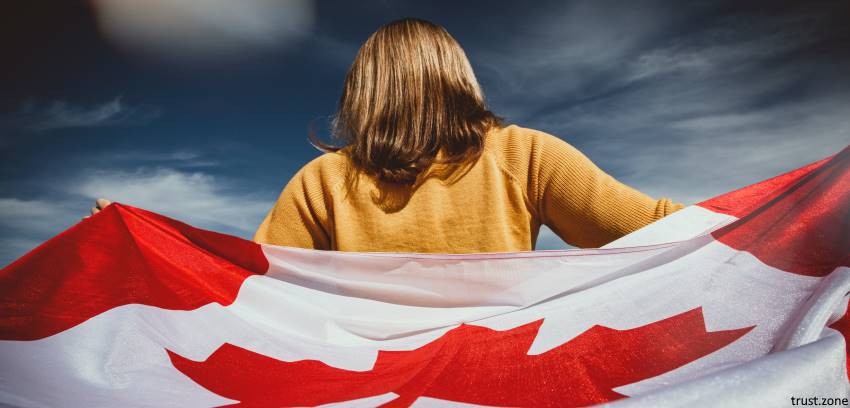According to the latest reports, VPN usage in Canada has grown by 206%. COVID-19 pandemic has also compelled many people to adapt to working from home. This rise in work from home has also supported the growth in the number of people becoming concerned with their devices' online security and personal data.
Let’s look at the most common VPN uses for those living in and traveling to Canada. Recently CanadaVPNs has listed Trust.Zone among the most reliable and efficient working VPNs in Canada and for Canadian expats.

As a member of the Five Eyes alliance, Canada is one of 5 countries alongside the USA, UK, Australia, and New Zealand that openly shares the data they collect on their citizens. Thus, it is one of the prime reasons for Canadians to use VPN while they are online surfing.
Protecting one's identity and data online is the primary use of a VPN. It's one of the most effective ways of both enhancing your online security and keeping your internet activity hidden from the prying eyes of internet service providers, hackers, and government agencies. A VPN gives you the liberty to speak and write without restrictions, as most countries do not support everyone's right to speech.
You must have wished to watch your favorite streaming service without any geo-restricted fuss about it. The gateway to this is by spoofing your IP address. VPNs can dodge the content providers into thinking you're at a different location. Whether you use Netflix or Amazon Prime Video, your VPN will help you unlock all the excellent content from all over the world.
Cybercrime is growing worldwide at an alarming rate. According to Canadian Center for Cyber Security: "Ransomware is one of the most common forms of cybercrime and is one of the cyber threats most likely to affect Canadians."
Ransomware is a type of malware attack that prevents the users of a device or network from accessing their device, network, or data until a ransom fee has been paid.
Employing a VPN will significantly enhance your device and data security, making you less of a target to hackers.
Wi-Fi at public places has become sort of a necessity. We need Wi-Fi at coffee shops to share our good-looking cup of hot coffee with friends. Check-in at the airport and making online hotel reservations requires people to use public Wi-Fi networks at all times.
This particularly increases the risk of onlookers having access to your private data. Besides that, working remotely demands using Wi-Fi on the move. Sometimes, your employees will have to travel out of the country for conferences, so business meetings mean you open up your devices to unreliable foreign networks.
More robust and trustworthy VPNs will have the required tools to encrypt your online traffic and make your presence safer on a foreign network.
Online shopping is something you would not want to do without having the safety of a VPN. Although shopping doesn't seem like it involves sensitive data, making purchases online requires personal information that could include bank account and retailer login credentials. A reliable VPN like Trust.Zone installed on your network would potentially secure your confidential information from any spy.
You can take care of many of your banking tasks without ever entering the bank. You can visit the bank's website to check balances, make transfers, and even deposit cheques and bills.
But beware, as anything you can do online, cyber-criminals or identity thieves might be on the look. They do not require heavy guns to rob you, but a few simple clicks can leave you bankrupt within minutes, make you a victim of credit card fraud, or even steal your identity.
A quality VPN can protect your online banking from hackers, malware, and even public Wi-Fi. By using a Virtual Private Network, nobody can read your encrypted online traffic. Logging into a VPN masks your IP address, which may cause the website to require an extra layer of authentication.
Have you ever noticed that you will occasionally see advertisements for that same thing or product later when you search for something online? On Facebook, Instagram, Twitter, and even Youtube.
Many privacy experts say that Google is collecting too much data on us. Media platforms allow users to create media accounts to provide behavioral and demographic data. This data can be collected from the online activities through your devices. Big data companies and scientists then compile this data and build personas about you to determine your age, gender, your likes and dislikes, and many more related things.
Essentially, companies are creating computer-based personalities based on a database collected from your devices that might provide more information on you than your close acquaintances. Your VPN subscription would primarily mask your online identity, allowing you to hide all your footsteps online.
IP address poses a significant threat to your privacy mainly when used in combination with personal information; it may determine your location. Based on your IP address, many websites like Netflix may monitor your activity and content.
Masking one IP address with another is a way to hide an IP address, and that’s exactly the function a VPN performs. This implies that you can access all the content you want without anybody checking on your location, regardless of the region. IP masking is essential if you're going to torrent, bypass geo-restricted content or censorship, and enjoy the freedom of being online. You can check out more ways to completely mask yourself online here.
The best VPNs have built-in protection against IP leaks and DNS leaks. They use Kill-Switch function which blocks outgoing and incoming traffic if connection is suddenly dropped by any reason. So, your IP address will never be leaked
Voice-over-Internet Protocol (VOIP) is a free and inexpensive way to call people. It may seem like a rare activity, but like any internet service, it can be hacked. A VPN can prevent people from tracking and intercepting your phone conversations.